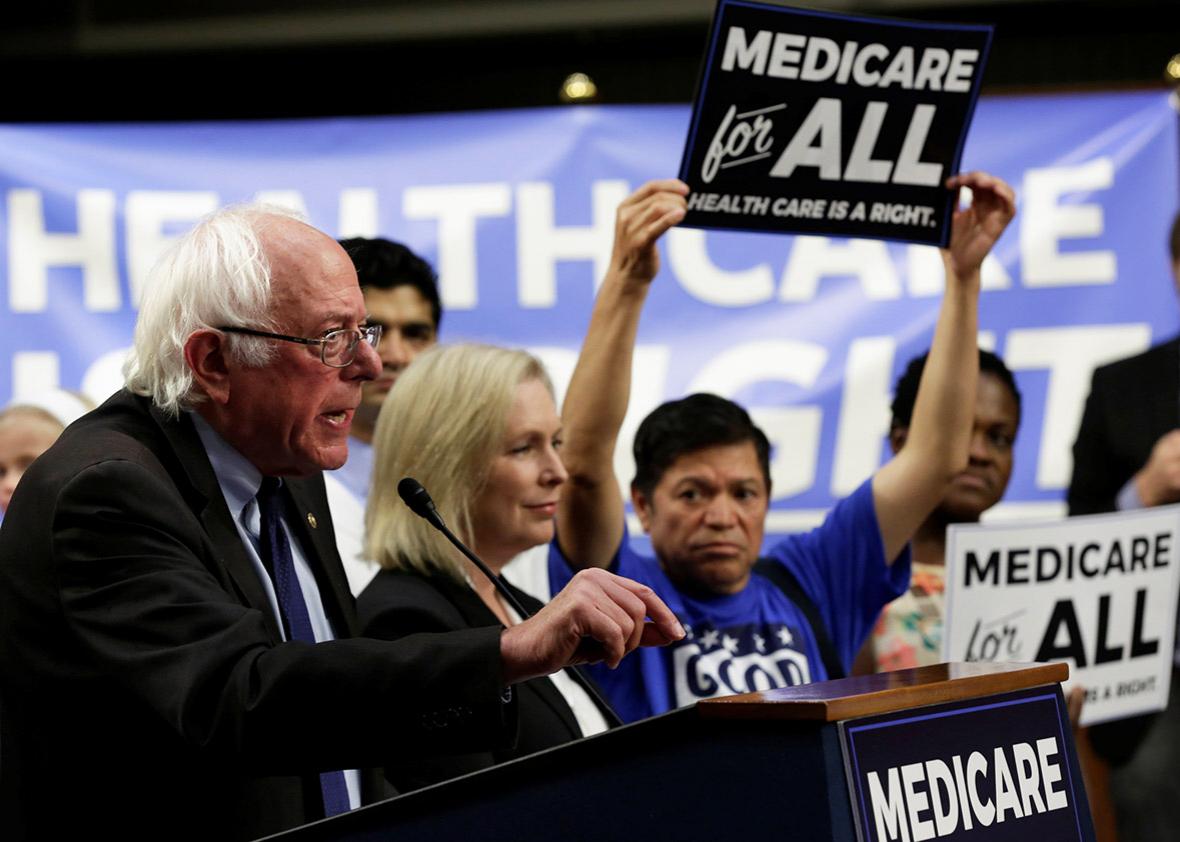On Wednesday, Vermont Sen. Bernie Sanders introduced the Medicare For All Act of 2017, his long-awaited single-payer health care proposal that (as of this writing) has earned 16 Democratic co-sponsors. That’s a 16-senator improvement on the last single-payer bill he introduced in the Senate. It’s not just fellow lefties, like Oregon Sen. Jeff Merkley and Massachusetts Sen. Elizabeth Warren, supporting the Sanders plan. The bill has also earned the co-sponsorship of more typically cautious Democrats like New York Sen. Kirsten Gillibrand and New Jersey Sen. Cory Booker, as well as one senator, Wisconsin’s Tammy Baldwin, who’s up for re-election in a state Donald Trump won. It has become difficult for any Democratic senator considering a 2020 presidential bid not to co-sponsor Sanders’ bill, a sign that support for single-payer will be the default position.
But how committed will that support be?
Single-payer supporters shouldn’t just take these supposed believers in government-sponsored health care at their word. Until they answer the difficult questions the Medicare for All Act of 2017 evades—omissions that were made specifically to earn their buy-ins—their support should be treated as posturing and not a true commitment to push for single-payer if and when they have the chance. The politicians latching onto single-payer to score points with the Democrats’ progressive base don’t owe those answers to Washington’s scolding policy wonk class. They owe a full litigation of the process to single-payer’s supporters, who deserve to know that their representatives aren’t making them promises they’re not willing to keep.
The Medicare for All Act is built on a compromise that works well in the short-term for both Sanders and his co-sponsors: the decision not to include financing details within the bill itself and instead offer a separate white paper with some financing options to “begin that discussion.” By separating out the spending, Sanders makes co-sponsorship an all-gain, no-pain decision. As Vox’s Jeff Stein explains, structuring the bill this way “will make it easier for Senate Democrats to co-sponsor the legislation and win over Sanders’s supporters, but also not co-sign their names to legislation calling for billions in new personal income taxes.”
The push for single-payer is a long project, and Sanders and his co-sponsors don’t need to commit to a financing model now. “We’d rather give the American people options,” Sanders said in an interview with the Washington Post. “The truth is, embarrassingly, that on this enormously important issue, there has not been the kind of research and study that we need.” Further study is a reasonable enough excuse for the moment, since it’s not like this bill is going anywhere in Paul Ryan and Mitch McConnell’s Congress. And there’s value, in terms of expanding the Overton window, in showing that an idea once relegated to America’s leftist fringe now has mainstream party buy-in.
But the process gets much harder from here, and it takes more than a chummy press conference for these members to show they’re serious.
Introducing single-payer—which would eliminate most existing insurance arrangements in a country where two-thirds of people are satisfied with their coverage—is always going to be the steepest of steep political tasks. The only way I’m certain it will never, ever happen, though, is if the politicians who promise they’ll support it don’t reckon with the difficult challenges that single-payer presents until the moment they’re forced to.
I spent the first half of this year writing about what happens when a party rides the wave of a promise it’s made to its base without bothering to address the trade-offs required to keep that promise. By ignoring those questions during the many years when they didn’t control every lever of government, Republicans ensured that the country would learn at the last possible moment that repealing Obamacare might make some stuff Americans care about a whole lot worse. Politicians got scared, the bill died, and Republicans lost whatever credibility they ever had on health care. There is a lesson here. That lesson is: Don’t do that.
I have never not supported single-payer. Though it is striking, and welcome, to hear more than one-third of the Senate Democratic caucus lay out a case for why for-profit insurance needs to go, that alone is not commitment. Commitment means educating the public on the whole product, including the specific levels of tax increase that will be necessary, and explaining why they’re worth it. It means telling voters directly that their taxes will go up, and not by a small amount—but by less than they had been paying in annual premiums.
This means having the courage to risk collapsing single-payer’s polling support and only then determining whether it’s a product worth pushing for legislatively. Anything else is opportunism and a guarantee that whoever wins the Democratic nomination in 2020 will stop talking about single-payer the moment he or she emerges from the primaries. Cory Booker, Kamala Harris, Elizabeth Warren, Bernie Sanders, and Kirsten Gillibrand don’t need to commit to a funding model now, or even next year. But they do need to make a commitment well before they have unified Democratic control of government and have to make good on a promise to the base. They need to tell people who are satisfied with their employer coverage that they will no longer have that coverage, and convince them that what they’ll get from a government-sponsored system will be better. They need to show, in short, that they’re not duping single-payer supporters to get their votes—that they care about single-payer health care as a government program they’re serious about implementing, and not just as a talking point.
